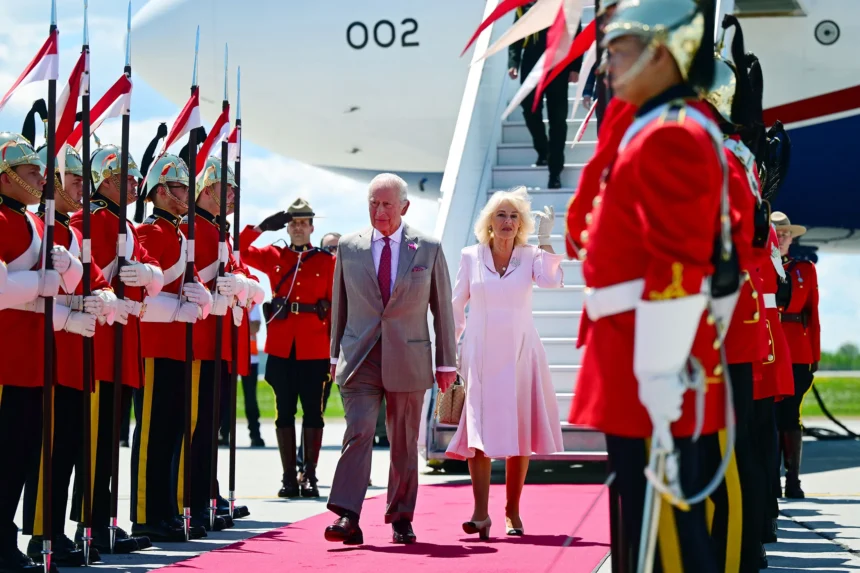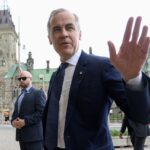OTTAWA – King Charles III, as Canada’s head of state, stepped foot in Ottawa on Monday to deliver the Speech from the Throne and begin the 45th session of Parliament. This marked the first time since 1977 that a monarch has personally read the throne speech in Canada.
The royal visit highlights how Canada’s constitutional monarchy continues to play a role in the country’s identity, especially in uncertain times. During their two-day stay, the King and Queen Camilla attracted international attention, not just for tradition, but also for the visit’s political meaning, given recent tensions between Canada and the United States.
Their plane landed at Macdonald-Cartier International Airport just after 1:00 p.m. ET on May 26. Prime Minister Mark Carney, his wife Diana Fox Carney, Governor General Mary Simon, and a group of Indigenous leaders and dignitaries welcomed them.
The greeting set a warm and respectful tone, mixing formal ceremony with a nod to the diverse cultures that make up Canada. As the royal couple arrived, a 21-gun salute echoed through the city, and the Royal Canadian Mounted Police formed a ceremonial honour guard, highlighting the monarchy’s lasting presence in Canadian life.
King Charles is Head of State
King Charles III’s role as head of state is mostly ceremonial but carries deep meaning within Canada’s constitutional system. Typically, the Governor General reads the Speech from the Throne on the monarch’s behalf. This appearance is only the third time since Confederation that a reigning monarch has delivered the speech, following Queen Elizabeth II in 1957 and 1977.
The speech, prepared by the Prime Minister’s Office, will lay out the government’s goals for the coming session. Many expect the King to add brief remarks about Canada’s unique character and strength during challenging times.
The timing of King Charles’s visit reflects recent political developments. Prime Minister Carney invited the King following comments from U.S. President Donald Trump suggesting that Canada might become America’s “51st state.” Earlier this month, Carney firmly rejected those remarks during a White House visit, saying Canada “is not for sale.”
He has used the King’s visit to strengthen Canada’s national pride and independence. “This honor carries great meaning right now,” Carney said. “It celebrates our long traditions, our friendship with the UK, the strength of our constitutional monarchy, and our shared history, which only grows stronger in tough times.”
The Speech from the Throne will take place on Tuesday at 11 a.m. in the Senate Chamber, with the King seated on a walnut throne decorated with gold maple leaves. The address is expected to announce new economic and security plans with the United States and focus on building a strong G7 economy, lowering living costs, and making communities safer.
The speech will be delivered in both English and French, reflecting Canada’s bilingual nature and commitment to unity.
Celebrating Canada’s diversity
During their stay, the King and Queen will also join community events that celebrate Canada’s diversity. On Monday, they visited Lansdowne Park, joined a street hockey game, and planted a maple tree—simple but meaningful acts that connect with Canadians and show support for the environment.
King Charles also met with members of the Whitefeather Forest Community Resource Management Authority to show his ongoing support for Indigenous reconciliation, a topic that has become more important since he became king in 2023.
The visit highlights the important relationship between Canada and the United Kingdom. As Commonwealth members, both countries share a monarch, legal traditions, and a commitment to democracy. Over recent years, both nations have worked to strengthen their ties, especially as Brexit changed Britain’s relationship with Europe and Canada faced new U.S. tariffs.
Canada’s recent $6-billion Arctic radar deal with Australia has led some to expect more defence and trade partnerships between Canada and the UK.
Not everyone supports the royal visit. In Quebec, Bloc Québécois leader Yves-François Blanchet announced his party would boycott the throne speech, calling the monarchy “irreconcilable” with Quebec’s modern values. Some Canadians, like Alexander Graboski of Calgary, think the monarchy is outdated and believe Canada should become fully independent from the Crown.
Throne Speech
Still, a recent poll found that support for ending the monarchy has dropped by 12 points since 2023, suggesting more Canadians are open to keeping the tradition.
For supporters of the monarchy, King Charles’s visit is a strong sign of Canada’s heritage. “Inviting King Charles III to deliver the Throne Speech was a smart move by PM Carney,” said John Hughes of Vancouver. “It sends a clear message to President Trump.” Others see the occasion as a reminder of Canada’s unique government, which separates it from the U.S. system.
As King Charles prepares to address Parliament, the world is watching Canada. The throne speech, given from a chair made from a Windsor tree, will set out the government’s plans and highlight the strong relationship between Canada and the United Kingdom. In a time of shifting alliances and bold statements, this royal visit is a strong display of Canadian identity, independence, and unity that reaches far beyond Ottawa.
Related News:
Canada Stays on Sidelines as World Leaders Ink Historic Trade Deals Amid Trump Tariffs







